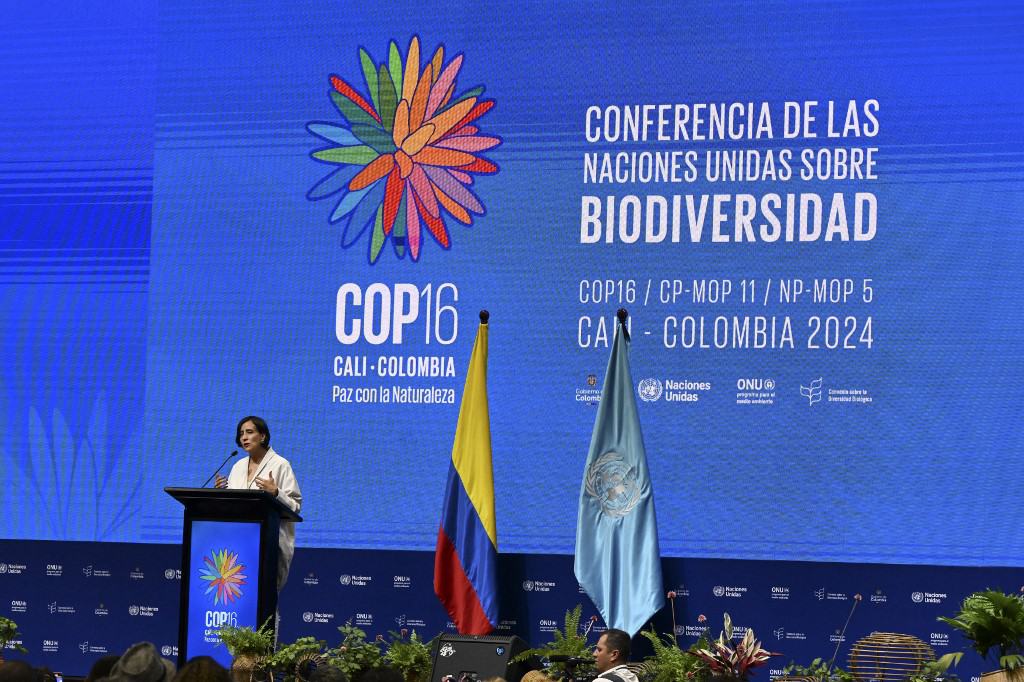The COP16, the largest United Nations summit for the protection of nature, concluded its first day on Monday in Colombia with urgent calls to invest resources and reach concrete agreements to stop the destruction of the planet’s biodiversity before it is too late. The two-week meeting of delegates from the 196 member states of the Convention on Biological Diversity (CBD) is taking place with active participation from Indigenous communities in Cali (southwest) and under strict security measures following threats from a guerrilla group.
Approximately 23,000 people, including a dozen heads of state and hundreds of ministers, have registered for the most attended edition of the COP, according to the organizers. In the streets, hundreds of Indigenous people from different regions of Colombia marched in traditional attire, carrying staffs, while a man dressed in white blew a conch shell, hoping that their ancestral knowledge of planet care would be considered during the summit.
Unresolved Challenges
The most urgent issue is gathering the necessary funds. Colombian President Gustavo Petro criticized in his speech on Monday that climate agreements “are not fulfilled because the most powerful countries simply do not have the will.” At COP15, held in 2022 in Montreal, countries committed to designating 30% of their land and seas as natural conservation areas by 2030. However, most are lagging behind.
Only 8.4% of the world’s oceans have been designated as Marine Protected Areas, according to a report released by Greenpeace on Monday. “We are six years away from 2030, and the progress toward the goal is almost nonexistent. At this rate, we won’t achieve that objective until the next century,” warned Megan Randles, public policy advisor at the environmental NGO.
On Sunday, UN Secretary-General António Guterres urged parties to make a “significant investment” in the Global Biodiversity Framework Fund (GBFF), created in 2023 to meet the Kunming-Montreal Global Biodiversity Framework’s goals, which include 23 targets to “halt and reverse” biodiversity loss by 2030.
However, so far, only 35 of the 196 countries have submitted their roadmaps to meet these objectives, according to the CBD. There is progress “but not at the pace we need,” said its Executive Secretary, Astrid Schomaker.
Point of “No Return”
Countries have committed to contributing around $250 million to the GBFF, according to agencies overseeing the process. These contributions are part of a broader agreement for nations to mobilize at least $200 billion annually by 2030 for biodiversity, including $20 billion annually by 2025 from wealthy nations to help developing countries.
According to the International Union for Conservation of Nature (IUCN), which maintains a red list of threatened species, more than a quarter of the species evaluated by the organization are at risk of extinction. Wildlife populations have decreased by 73% between 1970 and 2020, according to WWF.
“If we do not address the causes of biodiversity loss, our ecosystem will reach a tipping point, essentially a point of no return,” Lin Li, Director of Policy at WWF, told the press. Indigenous communities and youth groups urged governments and private sectors to invest in them.
Oswaldo Muca, from the Organization of Indigenous Peoples of the Colombian Amazon, called for “direct funding” as “compensation” for protecting nature.
Guerrilla Threat
COP16 is being held under the slogan “Peace with Nature” in a country with a six-decade armed conflict and which led Global Witness’s 2023 report on environmentalist killings, with 79 cases. On Monday, Vice President Francia Márquez, a social leader who survived an armed attack in 2019, dedicated her opening speech “to those who were silenced by the politics of death for raising their voices.”
The largest faction of the dissident FARC guerrilla group, the Central General Staff (EMC), is at war with the government and has vowed to disrupt the event. Around 11,000 Colombian police officers and soldiers, supported by UN and U.S. security personnel, have been deployed in Cali.
Colombia is one of the most biodiverse countries in the world, and the government has made environmental protection a cornerstone of its agenda. Delegates will seek to agree on mechanisms to share profits obtained from the genetic information of plants and animals.
Often, this genetic material comes from low-income countries, and pharmaceutical laboratories use it to create medicines that can generate tens of millions of dollars in profits, according to scientific estimates.






